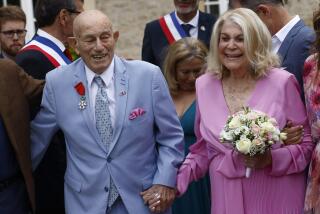Celebrating Peace in a War-Torn World
- Share via
On that August day in 1945 when the Second World War finally ended, my father was marking time in an Army tent in Germany. Like the rest of his campaign-weary buddies, he was ready to cut loose, get drunk, mark the close of the killing with one riotous party.
For American soldiers everywhere, the Japanese surrender--coming months after the German white flag--meant no more slogging through the mud and heat, no more insane beachhead invasions. No more getting shot at.
Still, even the partying was perilous.
“You didn’t want to walk around camp that night,” he recalled. “Guys were drunk, celebrating. They were shooting off their weapons. You were liable to get killed.”
The celebration was boisterous throughout much of the world. New Yorkers spontaneously danced in the streets. Farmers honked their horns all over the roads of the Midwest. Some towns blew whistles, summoning residents to the town square to deliver the news.
Schools closed early and bars filled to capacity as President Harry Truman declared a two-day holiday. People hummed a popular tune of the day that captured the spirit of the returning soldiers: “Kiss me once, kiss me twice, kiss me once again,” the lyrics went, “it’s been a long, long time.”
Rationing of gasoline and food was instantly lifted; gone were the much-joked-about coupon books.
“We celebrated in living rooms and backyards, in town squares and Times Square,” said Franklin Mitchell, a World War II scholar at USC. “There was this pent-up tension ever since Pearl Harbor that we were involved in a struggle of great significance.”
In a very few spots, it was a somber day. The emperor of Japan addressed his nation over the radio for the first time; most citizens had never been allowed to hear his voice before. He referred to the peace as a cease-fire, not a surrender.
The war had reached into nearly every corner of the globe; 50 million had died.
In the western United States, the camps where Japanese Americans had been kept prisoner for much of the war opened their doors wholesale, though many already had begun to slowly release their prisoners.
My father returned home to upstate New York, soon to marry, raise seven children and eventually become a grandfather five times over.
One thing he did not do was talk much about the war or his role in it.
In his view, there wasn’t much to say. He didn’t see himself as a hero. He spent most of his time behind the battle lines, never serving in the infantry. He brought home neither wounds nor medals.
He was just an average soldier, a young man in his 20s who went when he was called.
But what the film “Saving Private Ryan” has shown us--with its unforgettable scenes of the assault on Omaha Beach--is that World War II veterans often lived in terror and died unspeakable deaths. “Ryan” suggests that even average soldiers like my father performed the deeds of a brave generation.
My father served in the Army’s field artillery branch--anti-aircraft corps. He did his wartime work in North Africa, France, Italy, Belgium and Germany.
Shipping out to Casablanca, he met his first real wartime friend. Crossing rough seas, Nick from New York City was so seasick he couldn’t leave his bunk.
Nick said he wanted no more ocean crossings, that he’d rather die over there.
He did.
One winter night years later, after their battalion had stormed the beach at Anzio, two dozen soldiers had found shelter from the rain in a rundown chicken coop in the Italian countryside. Nick and my father argued over an old blanket and spent most of the night pulling it back and forth as they slept foot-to-foot.
“Finally, I said ‘Aw, Nick, go ahead and take it,’ ” recalled my father.
Hours later, a German shelling attack struck near the shack. In the ensuing confusion, a medic grabbed my dad and told him to search for survivors.
Going man to man, my father’s flashlight finally revealed the old blanket, torn to shreds by flying shrapnel. Nick’s body lay beneath it.
After my father came home, he kept in touch with a few buddies, then slowly let the relationships slide. Later, telling war stories to his grandchildren, he portrayed himself in a humorous light, a member of the gang who couldn’t shoot straight.
Then, on an Italian vacation, my father announced that he wanted to take the train to Anzio. He wanted to visit Nick’s grave.
We didn’t find it. A sudden downpour chased us into a local restaurant, where we ate pasta and talked little.
The war was over. For the average soldier, life went on.
More to Read
Sign up for Essential California
The most important California stories and recommendations in your inbox every morning.
You may occasionally receive promotional content from the Los Angeles Times.














